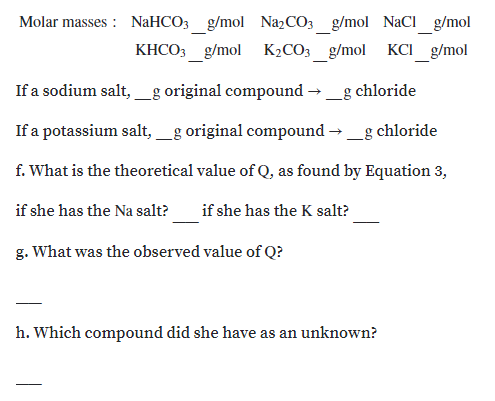Molar masses : NaHCO3_g/mol N22CO3_g/mol NaCI_g/mol KHCO3 g/mol K2CO3 g/mol KCI g/mol If a sodium salt,g original compound → _g chloride If a potassium salt,_g original compound →_g chloride f. What is the theoretical value of Q, as found by Equation 3, if she has the Na salt? if she has the K salt? g. What was the observed value of Q? h. Which compound did she have as an unknown?
A student attempted to identify an unknown compound by the method used in this experiment. She found that when she heated a sample weighing 0.5032 g, the mass dropped to 0.2663 g. When the product was converted to a chloride,the masswent back up, 0.3747 g.
a. Isthe sample a carbonate?
Yes / no (Circle one)
Please provide reasoning below.
b. What are the two compounds that might be in the unknown? c. Write the balanced chemical equation for the overall reaction that
occurs when each of these two original compounds is converted to a chloride.If the compound is a hydrogen carbonate, use the sum of Reactions 1 and 2. If the sample is a carbonate, use Reaction 2. Write the
equation for a sodium salt and then for a potassium salt.
d. How many moles of the chloride salt would be produced from one
mole of the original compound?
e. How many grams of the chloride salt would be produced from one
molar mass of the original compound?

Trending now
This is a popular solution!
Step by step
Solved in 5 steps with 4 images









